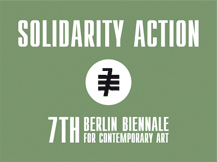The response to questions on the role of the artist, the lack of funding for culture and the political logic of distribution of resources lies in the concept of “doing”, which in turn brings us to the idea of work and of necessity. In this area I am convinced that Italy has fallen behind, or even regressed. We all know the reasons, though it is worth listing them again, for future reference: we have preferred the models of Dolce & Gabbana, the dancing girls, the TV blab-fests of Maria De Filippi; we have preferred the standard of sensationalism and mass-market viewing, which is much easier to understand. A preference in tune not so much with the attitude as with the habit of putting up with everything. This also corresponds (alas) with a form of democracy. We possess a peerless artistic tradition, but today’s educational opportunities are so weak that we cannot approach the new without seeing it as difficult, elitist. We see no alternative beyond what has become a choice dictated by habit, while the supply adapts to the demand. Today information has no more limits, but we allow those who govern to foist on us a stifled system that offers the possibility of an adequate education only to those with sufficient economic means. Apart from the demand, the present institutional cultural supply seems to fear going beyond the boundaries of the ordinary. Culture represents a determining value in the economic and intellectual growth of a country, because artistic production, beyond its cultural value, also constitutes an important part of the economic output of a nation. In this devaluation of culture, the corruption encouraged by bad management of economic resources finds fertile ground. Why does the State uselessly spend resources to project the face of Nero on the Fori Imperiali and to write “Nerone” on the windows of the Colosseum? Wouldn’t it be better to use the funds to purchase contemporary artworks? There is a need to teach the younger generations to ‘see’, to break up the self-sufficiency of the auteur and to restore power to the faculty of doubt, putting our minds in a state of alert. The artist is not an icon but an instrument to provide useful stimuli. Art is a magnifying glass for the world, and in the continuum of time it represents, for man, the relationship with truth and history. Art is a means that lets us breathe when the air gets stifling. I believe in the force of the artwork, in its small and most spectacular manifestation. From the big museum shows to studio visits, art should be narrated and explained by artists, not just in the art academies, but also in technical schools, classical and scientific high schools. All this would represent a very profitable investment, independent of the value set on it by the market. And it would be fundamental for ethical and economic progress, which could also lead to improvement in the management of the public sphere. Continuing to do my work is still the only solution that can lead to improvement. I am fortunate, because I have been able to choose, and I have enough curiosity. The artist’s job is one for which often there is no pay, but it requires all of his time and a lot of energy. Because first of all it is a need, and as such it should be protected.
ALESSANDRO PIANGIAMORE
Artist. Lives and works in Rome.


